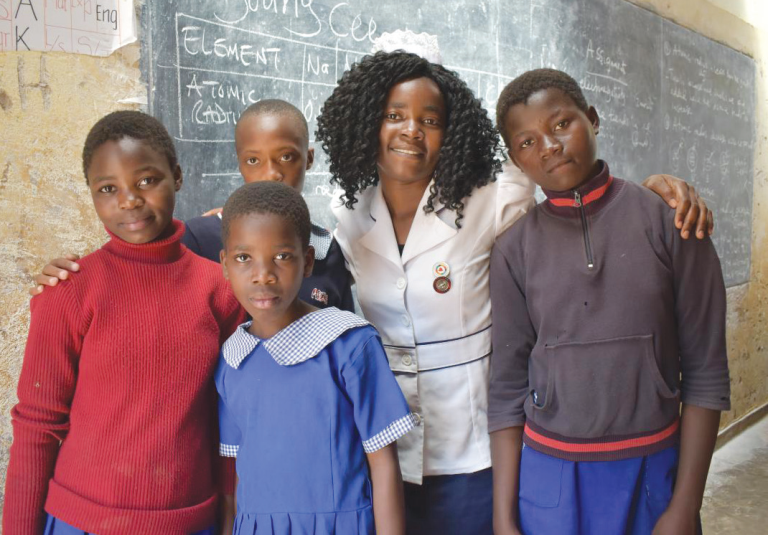There is something about nurses and doctors that motivates Princess Chamasowa to work hard in school.
For the 12-year-old Standard Eight girl at Mphande Primary School in Mwanza, it is not the spotless uniforms and props they use to save lives. Rather, the health professions personify the greatest law in life.
Tambala poses with her confessed admirer Princess (L) and her peers
“My parents taught me to love everyone as I love myself, so I want to become a health worker because they sacrifice a lot to care for people not related to them,” she says.
Princess works hard in class to achieve her dream. In September, she scored number one in examinations marking her transition from Standard Seven to eight.
She was ecstatic on September 16 when the Ministry of Education brought role models to motivate learners from different primary schools in Mwanza to remain in school and keep their dreams alive.
Role-modelling
After starring in a play demanding an end to harmful practices fuelling early pregnancies and marriages, Princess met with her role model—Reminiscence Tambala.
The nurse from Mwanza District Hospital delivered a motivational talk alongside Diana Mituka, the headteacher of St John’s Primary School in the vicinity.
The open day was convened with support from the United Nations Multi-Partner Trust Fund and Unicef Malawi to benefit children likely to quit school due to a lack of role models, harmful cultural practices and indifference.
Tambala urged children in the border district and beyond to stay in school against odds, work hard and dare to dream big.
She warns them against being dazzled by the allure of money circulating in the district split by a busy transport corridor between Malawi and Mozambique.
The nurse reckons the travellers usually flash cash to lure girls into transactional sex, fuelling teen pregnancies, child marriages and school dropouts. According to public health experts, Mwanza sits along one of southern Africa’s fiercest corridors of infection.
“Children shouldn’t dream of getting married or pregnant, but come to school to learn and improve their lives. After all, marriage and babies can wait,” she says.
At 28, Tambala has one child, but most of her primary school classmates have three to four children. She says keeping a girl in school is one of the best ways of delaying marriage and reducing the number of children in her lifetime.
The census shows a Malawian girl will likely have four children in her lifetime.
However, child marriages and teen pregnancies in Malawi remain a rampant violation of children’s rights, threatening their education and health.
Staying the course
The Malawi Demographic and Health Survey of 2015 shows nearly half of girls marry before age 18, and a third fall pregnant before age 19.
Tambala praises teachers as well as her parents, for keeping her in school until she qualified for a nurse’s uniform.
She was selected to Phalombe Secondary School from the neighbouring Mpatsa Primary School in 2007. After Form Two, she shifted to Providence secondary school in Mulanje, from where she went to St Joseph’s College of Nursing and Midwifery at Nguludi in Chiradzulu district.
She explains: “Growing up in a family of teachers near Holy Family Nursing College in Phalombe, I dreamed of becoming a nurse, and my parents always encouraged me to work hard until I became one.
“I was mostly motivated by frequent sights of student nurses wearing their neat uniforms.”
Tambala says the nurses’ dress, aprons and caps don’t push her to selflessly care for patients in her hospital’s 51-bed female ward and inspire girls to dream big.
“Girls need motivation because if they learn, they support more people than boys do. When a girl quits school, I feel for her and her parents who make huge sacrifices to ensure children learn and acquire skills to uplift themselves,” she explains.
Loyce Fatchi, chief economist in the Ministry of Education’s Planning Department, thanks partners such as Unicef for supporting role modeling sessions and community sensitisation campaigns to keep girls in school.
“Role models are important because they awaken children, parents, and communities to the importance of education despite their challenges. When girls remain in school, they delay their chances of becoming teen mothers before they become independent. They face a low risk of being abused by their partners because they are likely to become independent,” she states.
Investing in girls
Fatchi held talks with 20 girls from four schools who returned to school after dropping out due to teen pregnancies and child marriages. The ministry is working with mother groups and other community structures to end the twin threat to girls’ education and chances in life.
She explains: “Mwanza is one of the districts with high dropout rates, so we advised the girls who have re-enrolled to send the message to fellow learners, parents and the community so that the whole district is aware that we want girls to stay in school like boys.”
Mituka, a widow who has taught for 22 years and singlehandedly educated her two sons, urged the learners not to relent in pursuing their life goals.
She states: “I faced a lot of hardship growing up, but I put school first because I wanted to be a teacher or a nurse.
“Today, I’m not just an ordinary teacher, but the headteacher at a school with 413 girls and 330 boys.
“Besides, Jones, my firstborn, is a soldier at the Malawi Armed Forces College and Wezzie, the younger one, sat Malawi School Certificate of Education [MSCE] examinations this year.”
The post Princess meets her model appeared first on The Nation Online.
 Moni Malawi
Moni Malawi 

